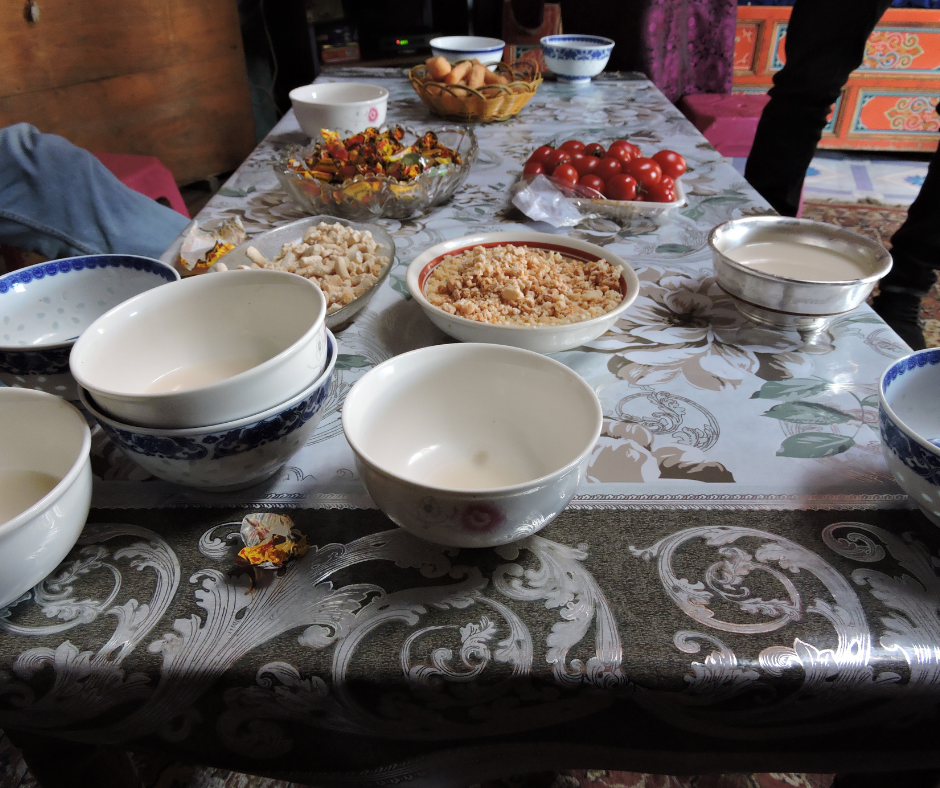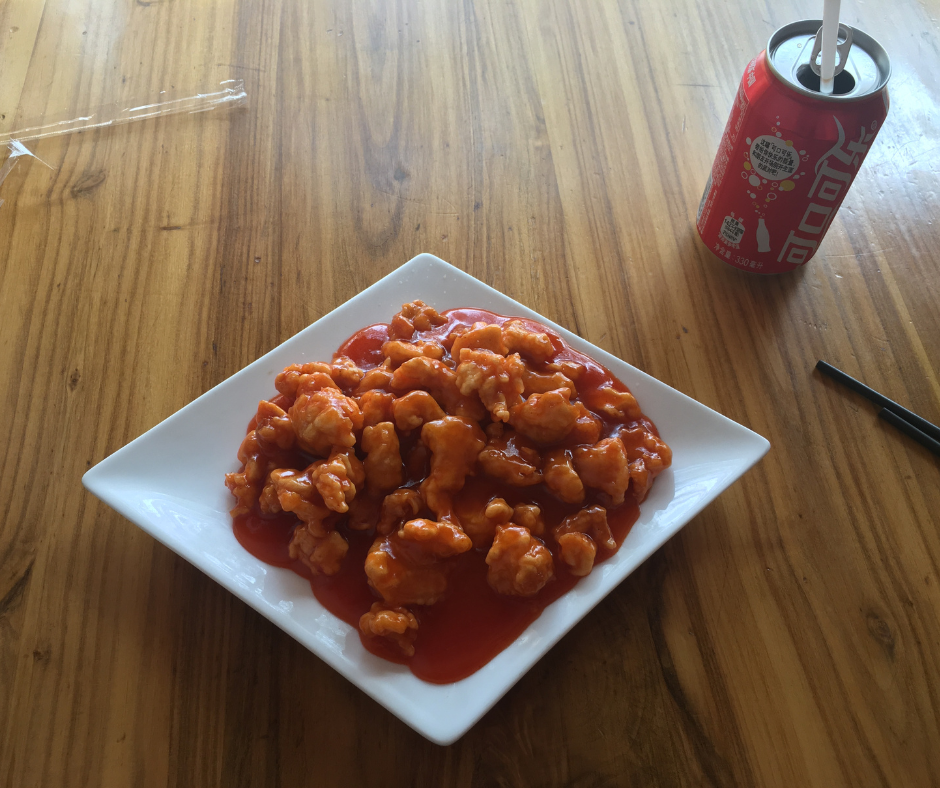While you shouldn’t let your dietary needs dissuade you from taking this incredible journey, I’m not going to sit here and tell you, “it’s all good” because it most certainly isn’t. This is an area of the world where you will have trouble trying to meet certain dietary requirements. I’ve designed this article to offer practical information about safe eating while on this amazing journey.
General
These tips go out to everyone, and to be honest if you’re a seasoned traveller you should pretty much have this stuff figured out:
- Don’t drink the tap water – I mean it! Under any circumstances. Even if you have a guide and they say it’s ok – IT ITSN’T! I’ve had a few of my tour passengers ignore me when it comes to this and all have paid the price! And when I say don’t drink the water, yes that also means don’t use it to brush your teeth.
- If it doesn’t taste right, don’t eat it! I don’t care if you’re staying in a traditional Ger with a family in Kyrgyzstan and you don’t want to offend them. Make an excuse! I recently had a bad experience with chicken in a restaurant in Bukhara in Uzbekistan, the chicken tasted a bit strange, but I assumed it was the dish. It wasn’t. I was basically crippled for two days, one of those days I had to deal with the tedious border crossing into Turkmenistan with 8 rather uppity clients.
- Try the local food, but don’t live on it. Yes, trying the local food is great and this area has some of the most amazing food I’ve ever tasted, however your body isn’t used to it. Eating a load of strange food and not giving your body a break, especially spicy food loaded with chilli like they serve in Western China or oily food like you sometimes get in Central Asia can really upset your stomach. While there are no McDonald’s or takeaway joints on most of the route, you can ensure your bowels are kept happy by eating food from your own culture which your stomach is used to every so often. There is no shame in needing some food that is just “normal” to you. I think I’ve had McDonald’s in basically every country I’ve been to that offers it. Western China – has no American take away joints, but they do have “Dickos” it’s a bit like the Chinese Version of KFC – that counts as trying local food doesn’t it?
- Be wary of salads! A salad has likely had its ingredients washed in tap water. Refer back to point 1.
Vegetarian
- China, you won’t have any problems. All restaurants have stir fry veggies on the menu and they love their tofu. (I’m a proud carnivore and even I love their tofu!)
- Central Asia (Kyrgyzstan, Uzbekistan, Turkmenistan) – in these places once lived & still live nomads, nomads who hunted. They are not overly oriented around vegetables and meat free products. They are however big on fresh produce, you can always find eggs for breakfast, as well as toast and usually home-made jam. Local markets are great, for guaranteed vegetarian options, buy your own fresh produce or visit restaurants in larger towns which may have an English menu with a few options.
- Iran – Kebabs, Kebabs everywhere! Persian cuisine has lots of great vegetarian rice dishes and more English is spoken here than you think. Chances are if you’re in a fairly decent restaurant someone will speak some English. Fast food wise, Northern Iran is a real treat, especially Tabriz. My favorited dish is actually street food – it’s mashed potatoes and egg wrapped in a pitta bread. So Good! Wow, I’m actually thinking of trying to make one right now!
- Armenia, Georgia & Turkey – here you shouldn’t have any problems. English is widely spoken, and Georgia and Turkey have a wide range of vegetable dishes and menus are nearly always in English.
- To be safe – have your dietary requirements written down in Chinese, Russian (for the Stans), Farsi and Armenian. Don’t write I’m a Vegetarian. The Chinese seem to think a fish is a vegetable. Write I can not eat meat, fish or Chicken. Another card with “Does this dish contain meat, fish or chicken” would also be helpful.
- Refer to point in above paragraph about salads.
Vegan
This one will be quite difficult – many people in this area of the world won’t even know what vegan means, so you will really need to prepare yourself.
You should have cards written in Chinese, Russian, Farsi & Armenian detailing what your diet involves. Don’t write that you’re a vegan, many people won’t know what this means, even “I don’t eat animal products” will cause some confusion. Like the points for Vegetarians above you will need to write down what you either can or can’t have and another card asking if the dish contains any forbidden ingredients. (List the ingredients)
China shouldn’t be too difficult, they always have vegetable dishes and tofu dishes on the menu, it may be difficult to find out if ANY animal products have been used at all, hence the need for the cards.
- You should have cards written in Chinese, Russian, Farsi & Armenian detailing what your diet involves. Don’t write that you’re a vegan, many people won’t know what this means, even “I don’t eat animal products” will cause some confusion. Like the points for Vegetarians above you will need to write down what you either can or can’t have and another card asking if the dish contains any forbidden ingredients. (List the ingredients)
- China shouldn’t be too difficult, they always have vegetable dishes and tofu dishes on the menu, it may be difficult to find out if ANY animal products have been used at all, hence the need for the cards.
- Central Asia (Kyrgyzstan, Uzbekistan, Turkmenistan) – Here you are going to have a problem. This is a very meat oriented culture and I would stick to the cities, where you may be able to find the occasional English menu and fresh food market. If you really want to do a homestay or go and spend a few nights in a Ger with the nomads, be prepared! Visit a fresh food market before leaving town and bring your own food. The cards will also help here (Russian), to explain why you are not eating the hosts cooking and so you don’t cause offense.
- Iran – Again, Persian food is very meat based, but they do have some great rice dishes. Zereshk Polo (contains beans) is an amazing dish which contains no animal ingredients. They also have some great stews Fesenjan (Pomegranate Walnut Stew) and Bademjan (Eggplant and Tomato Stew). Use the cards (Farsi) to make sure the cook has not added anything that comes from an animal.
- Armenia, Georgia & Turkey – English is widely spoken in these countries (perhaps a little less in Armenia outside of Yerevan) and you should be able to just ask what is in a particular dish.
- Fruit, will be a god send for you. It is available everywhere and can be purchased for next to nothing. A word of caution, make sure you rinse it in bottled water before you eat it. I had a passenger pick berries off a tree in Osh, Kyrgyzstan and eat them (after telling him not to!) and by morning he was so sick he could barely stand.
Gluten Intolerance
- Start in China – its all downhill from there. The Chinese obviously love their noodles, so especially on the trains, your choices are going to be fairly limited. (Read post here about eating on Chinese Trains). Bring some gluten free noodles from home to get you through the train journeys, you will also be able to supplement this with fresh fruit which can usually be purchased on board.
- Central Asia (Kyrgyzstan, Uzbekistan, Turkmenistan) – these are very meat based cuisines. After getting out of China and all it’s noodles, you are going to want to eat your way through these places.
- Iran – Kebab Central. They love their meat, so you’ll be fine here. They also have a lot of rice dishes which are amazing. Be sure to try Tah-Cheen an amzing lasagne type dish of rice, barberries and chicken and all sorts of amazing Persian spices! My favorite!
- Armenia, Georgia & Turkey – Again, English is widely spoken in these places, so you shouldn’t have a problem. They do love their bread in Georgia, however they also love their vegetables.
- You should have your specific dietary requirements written on cards in Chinese, Russian (probably won’t use it) and Armenian, again don’t say you’re “Gluten Free” most people won’t know what this means or know what contains gluten and what doesn’t. “Does this contain….list of gluten offensive ingredients” is what will be helpful.

Lactose Intolerance
- None of these countries are going to be a problem for you. I don’t think I’ve ever see a dairy based dish in China or even milk at a breakfast table. They just don’t like dairy. Central Asia, there is a fair bit of dairy around, but it is easily avoided, same with Iran.
- Georgia – they seem to put cheese in everything, so just be careful of that.
- You should still have cards in the appropriate languages Russian, Armenian & Farsi to ask if the meal contains, milk, yoghurt, cheese etc. Forget it for China, you won’t need it.
Specific Allergies
- The best advice I can give you is to have a card translated into every language (Chinese, Russian, Farsi, Armenian, Georgian and Turkish) just to be extra certain that dishes in restaurants don’t contain the offending ingredient. Tell them what will happen to you if you eat the offending ingredient so they know you’re not just being fussy.
- Learn the word (its only one word after all) in all the languages so you can read it. I know the words for liver (not allergic, just don’t like it) and cinnamon (yes, I know it’s a weird allergy) in about 12 languages.
- Fresh food markets are great, grabbing some fruit or some ingredients to make your own food obviously ensures you won’t ingest the offending ingredient.
Hopefully, this has been a useful introduction to specific dietary requirements while on the Silk Road.





